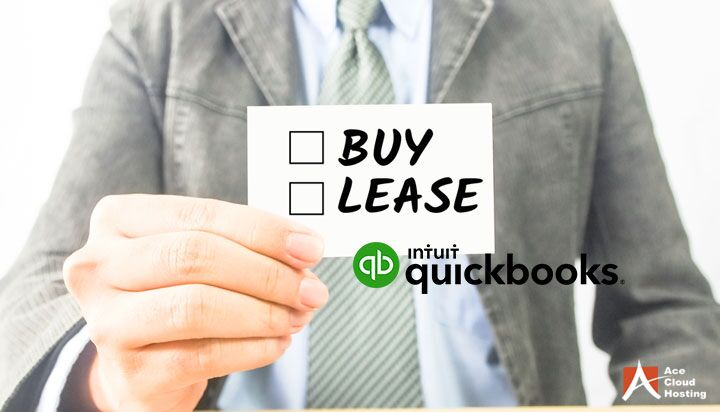One of the most popular and reliable accounting software, QuickBooks, has significantly transformed the way accounting operations are performed. Whether it is keeping track of the inventory, managing bills, business payments, or generating reports, QuickBooks covers them all.
 Depending on your work requirements, you can buy the QuickBooks accounting software license or lease it. Purchasing the license gives a sense of ownership while renting it can be cost-effective. Hence, both the arrangements have their pros and cons.
Depending on your work requirements, you can buy the QuickBooks accounting software license or lease it. Purchasing the license gives a sense of ownership while renting it can be cost-effective. Hence, both the arrangements have their pros and cons.
Here, we will share some insights to help you decide whether to buy the QuickBooks license or lease it. Read on!
Understanding the Differences Between Purchase and Lease of QuickBooks
1. Buying QuickBooks License
Understanding the difference between buying and leasing QuickBooks license is important. It will help you choose the best fit for your business depending on your business requirements.
Buying a QuickBooks license gives you tangible ownership of the product. Once you buy the product, you can use it under the QuickBooks license’s terms and conditions. Below-mentioned are some of the factors that will help you decide whether you should buy a QuickBooks license or not:
- Industry type
- Size of your company
- Number of employees in the organization
- Number of QuickBooks users, etc.
2. Leasing QuickBooks License
When you lease a QuickBooks license, your cloud hosting provider offers you a variety of advantages. Top-notch data security, high uptime, round-the-clock customer support, and easy collaboration, to name a few.
Leasing a QuickBooks license doesn’t require installing multiple copies of the software on individual computers. QuickBooks resides on a remote server managed by your cloud hosting provider. You can access the software over the internet from any geographical location.
In addition to the above, you can benefit your company financially when QuickBooks is hosted on the cloud. This is because the hosted QuickBooks software eliminates the requirement of expensive, on-site technical arrangements. Moreover, you get the flexibility to allow the employees of your organization to work from across the globe. With a cloud-hosted QuickBooks solution, you get instant data backup, eliminating the requirement to create your off-site backup solution.
Unlike purchasing a QuickBooks license, you pay a subscription fee to your cloud hosting provider when you lease QuickBooks. It means that you can use the software as long as you pay the cost. Based on your specific business needs, renting a QuickBooks license can reap multiple advantages.
Also Read: Top Advantages of QuickBooks Cloud Hosting
Pros and Cons of Purchasing QuickBooks License
Pros:
- Purchasing a QuickBooks license enables you to have full authority over the product. There are no liabilities or dependencies as with the renting of the software. The service provider might change some of the policies when you have rented the application, but these policy changes are not affected once you have bought the software.
- If you buy the application, there are no recurring subscription costs, which will lead to reduced overall expenses in the long run.
- You get additional support and setup benefits from the service provider if you purchase the application in contrast to leasing it.
Cons:
- There is a higher upfront cost for buying a QuickBooks license.
- If a new update rolls out, you might have to pay additional charges to upgrade the features.
- Purchasing a QuickBooks license limits the access to a particular number of users that were once opted for during the initial payment.
Who should buy a QuickBooks license?
Large enterprises or settled businesses can buy the QuickBooks license as they don’t have fluctuating demands as compared to SMBs. It is a beneficial investment for these businesses in the long run.
Pros and Cons of Leasing QuickBooks License
Pros:
- Renting a QuickBooks license enables you to choose from flexible monthly pricing plans that can be scaled according to business demands. Hence, you can add or remove users and even change the requirements to suit client needs.
- Leasing a QuickBooks license has a lower upfront cost. It further helps you to prioritize hardware and infrastructure expenses.
- You get updated features of the accounting application with every update.
Cons:
- When you lease the QuickBooks license, recurring costs lead to higher overall investment in the long run.
- Renting the QuickBooks license implies that you must comply with any policy changes when using the software. These changes can impact the accounting application’s usage and might cause workflow disruptions.
Who should lease a QuickBooks license?
It is an optimum solution for startups and SMBs to lease QuickBooks license instead of purchasing it in their initial stages. It helps them to save capital expenses and focus on improving customer experience.
Conclusion
Deciding between buying or leasing a QuickBooks license can be challenging. Therefore, it is crucial to analyze your requirements to make an informed decision.
Ace Cloud Hosting is an Intuit-authorized QuickBooks Solution Provider that can help you choose the right option.
Got queries? Feel free to contact us at +1-855-363-0916.







